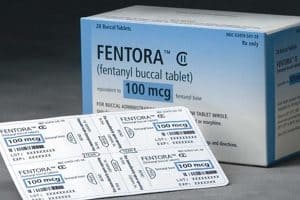
Fentora Side Effects Injury Lawsuits. Fentora, a popular narcotic painkiller manufactured by Cephalon, was implicated in the deaths of four people in September 2007. The drug, which was approved by the Food and Drug Administration (FDA) in 2006, is only approved for use in cancer patients in severe pain. ‘Fentora’ contains fentanyl, a highly […]

Fentora Side Effects Injury Lawsuits. Fentora, a popular narcotic painkiller manufactured by Cephalon, was implicated in the deaths of four people in September 2007. The drug, which was approved by the Food and Drug Administration (FDA) in 2006, is only approved for use in cancer patients in severe pain. ‘Fentora’ contains fentanyl, a highly addictive opiate 80 times more powerful than morphine. Fentanyl is considered a Class II substance by the Drug Enforcement Administration, putting it in the same class as cocaine or heroine.
‘Fentora’ is a faster acting version of Cephalon’s Actiq, another narcotic painkiller. Sold as a berry-flavored lozenge on a stick, Actiq has been linked to more than 120 deaths, including those of two children who thought the drug was candy. Actiq will soon be available in a generic version, and Cephalon says that it will eventually seek approval for ‘Fentora’ to be used to treat all acute pain that does not respond to other opiate painkillers.
Unlike Actiq, Fentora is sold in a pill form. For now, Fentora is approved only for use in cancer patients already taking morphine or other narcotic painkillers. ‘Fentora’ was meant to relieve brief periods of break through pain that occurred following the administration of these other narcotic painkillers. According to the warning letter Cephalon sent to physicians following the four deaths related to Fentora, none of the fatalities occurred in cancer patients. Two deaths occurred in patients prescribed ‘Fentora’ for headaches, a third was the result of improper dosing and a fourth used the drug to commit suicide.
Off label use occurs when a drug is used to treat a condition for which it was not approved. It is known that physicians prescribe ‘Fentora’ to treat headaches and back pain, even though it is only indicated for use in cancer patients. Such off label use is not illegal. However, a drug company is barred from marketing a medication based on its off label uses.
Cephalon has been in trouble before for marketing the off label uses of Actiq. In 2006, an investigation conducted by the Wall Street Journal found that 80-percent of those being treated with Actiq were not cancer patients. That same investigation found that Cephalon often marketed Actiq to sports medicine and family practice physicians, and not just cancer specialists. A 2006 investigation by the Connecticut Attorney General found evidence that Cephalon had been marketing Actiq for off-label use, including setting high sales quotas for the drug that could only be reached if Actiq was prescribed off label.
Now, Cephalon is being investigated by Connecticut, as well as the US Attorney in Philadelphia and the US Congress for the off label marketing of ‘Fentora’. Since it was approved, more than 80,000 prescriptions have been written for Fentora a high number considering the limited uses for which it was approved. Considering Cephalon’s history of off label marketing with Actiq, suspicions have been raised that the company is employing the same type of marketing with ‘Fentora’.
If you or a loved one has been injured by Fentora, you may have valuable legal rights. Please fill out the form at the right for a free case review by a qualified attorney or call us at 1-800-YOURLAWYER (1-800-968-7529).


